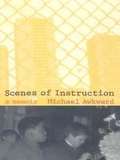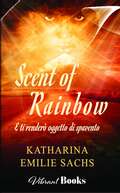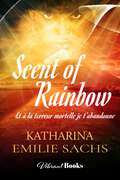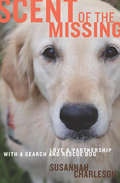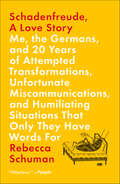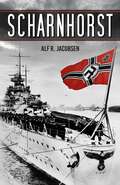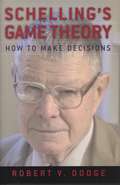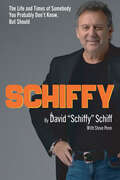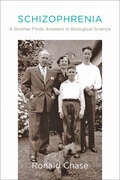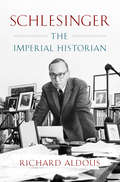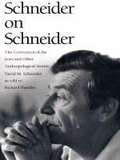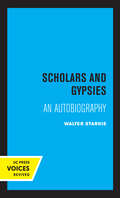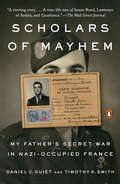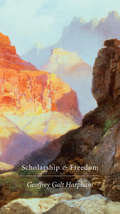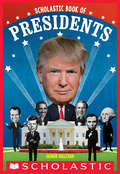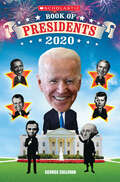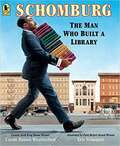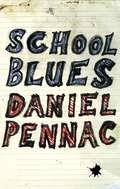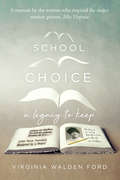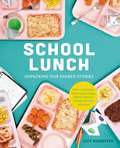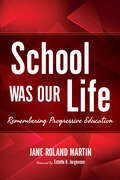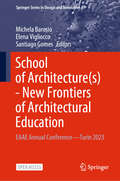- Table View
- List View
Scenes of Childhood
by Sylvia Townsend WarnerIn the course of her brilliant career Sylvia Townsend Warner wrote superbly in many and diverse forms but never penned a memoir, properly speaking. However, from the 1930s to the 1970s she did contribute a series of short reminiscences to the New Yorker. Scenes of Childhood collects and orders those reminiscences, thus forming a volume that reads as a joyous, wry and moving testament to the experience of being alive. The collection evokes a recognisably English world of nannies, butlers, pet podles, public schools, 'good works' and country churches, but the resonances of these stories are universal - funny and touching by turns.
Scenes of Instruction: A Memoir
by Michael AwkwardScenes of Instruction is the memoir of noted scholar of African American literature Michael Awkward. Structured around the commencement ceremonies that marked his graduations from various schools, it presents Awkward's coming-of-age as a bookish black male in the projects of 1970s Philadelphia. His relationships with his family and peers, their struggles with poverty and addiction, and his eventual move from underfunded urban schools to a prestigious private school all become parts of a memorable script.With a recurring focus on how his mother's tragic weaknesses and her compelling strengths affected his development, Awkward intersperses the chronologically arranged autobiographical sections with ruminations on his own interests in literary and cultural criticism. As a male scholar who has come under fire for describing himself as a feminist critic, he reflects on such issues as identity politics and the politics of academia, affirmative action, and the Million Man March.By connecting his personal experiences with larger political, cultural, and professional questions, Awkward uses his life as a palette on which to blend equations of race and reading, urbanity and mutilation, alcoholism, pain, gender, learning, sex, literature, and love.
Scent of Rainbow: E ti renderò oggetto di spavento
by Katharina Emilie SachsQuando nel 1901 arriva con la sua famiglia sull’isola caraibica della Martinica, il governatore Louis Mouttet, abituato agli agi della sofisticata vita coloniale, si aspetta di inaugurare la tappa più bella della sua carriera. Grazie a questo incarico, la prosperità, la felicità domestica e la considerazione sociale, raggiunte con il duro lavoro in quanto figlio di un calzolaio, dovrebbero raggiungere il loro temporaneo culmine. Eppure, appena giunto, il nuovo governatore si scontra con un muro impenetrabile di freddo rifiuto, e solo a stento riesce a preservare la propria autorità. Quando poi il vulcano del monte Pelée scuote la terra, seppellendo la città di Saint-Pierre, la ‘perla delle Antille’, sotto una coltre di cenere sempre più spessa, l’atmosfera politica che circonda Louis Mouttet incomincia a ribollire. Abbandonato sempre più a se stesso da Parigi, intrappolato nell’intrigo di fili politici della Terza Repubblica, tremante di malaria, il governatore si trova di fronte a una scelta che nessun politico francese era mai stato costretto a compiere prima di allora. Affidandosi a un lieto fine, trascura il potere del destino; poiché nulla può scongiurare il pericolo infernale dell’isola, un tempo doppiamente maledetta, né salvare la città, considerata empia. Una catastrofe di proporzioni inaudite si avvicina. Il contesto storico: L’otto maggio del 1902, quasi tutti i 30.000 abitanti di Saint-Pierre perirono a causa dell’eruzione del monte Pelée. Per quasi un secolo ne fu attribuita la colpa a Louis Mouttet, il governatore dell’isola. Questa è la sua riabilitazione.
Scent of Rainbow: Et à la terreur mortelle je t'abandonne
by Katharina Emilie SachsLa Martinique sert de décor à ce roman dont l’histoire se déroule à la fin du XIXe siècle, époque de l’éruption de la Montagne Pelée. Ceci est un hommage au personnage central, à savoir le gouverneur Louis Mouttet, qui ne parvint pas à sauver de nombreuses vies lors de l’éruption volcanique, car ignoré du gouvernement en France. Il fut longtemps tenu pour responsable des conséquences désastreuses de la catastrophe de 1902. Ce livre met en exergue l’incurie du gouvernement français à l’époque. La question qu’il incite à se poser est la suivante : le gouvernement ferait-il encore preuve d’incurie si l’un de ses territoires lointains était de nouveau en proie à une catastrophe de cette envergure ? Il y a fort à parier que la réponse serait oui.
Scent of the Missing: Love and Partnership with a Search-and-Rescue Dog
by Susannah CharlesonA &“haunting meditation on trust, hope and love&” by a woman who adopts and trains a Golden Retriever puppy to become a search-and-rescue dog (People). In the wake of the Oklahoma City bombing, Susannah Charleson&’s attention was caught by a newspaper photograph of a canine handler, his exhausted face buried in the fur of his search-and-rescue dog. Susannah, a dog lover and pilot with search experience herself, was so moved by the image that she decided to volunteer with a local canine team, plunging herself into an astonishing new world. While the team worked long hours for nonexistent pay and often heart-wrenching results, Charleson discovered the joy of working in partnership with a canine friend and the satisfaction of using their combined skills to help her fellow human beings. Once she qualified to train a dog of her own, Charleson adopted Puzzle—a smart, spirited Golden Retriever puppy who exhibited unique aptitudes as a working dog, but was a bit less interested in the role of compliant house pet. Scent of the Missing is the story of Charleson&’s adventures with Puzzle as they search for a lost teen; an Alzheimer&’s patient wandering in the cold; and signs of the crew amid the debris of the space shuttle Columbia disaster—all while unraveling the mystery of the bond between humans and dogs. &“A riveting view of both the human animal bond and the training of search and rescue dogs. All dog lovers and people interested in training service dogs should read this book.&” —Temple Grandin, author of Animals Make Us Human
Schadenfreude, A Love Story
by Rebecca Schuman“A wild and wonderful ride” from a comic memoirist “who writes brilliantly about Germany and Germans . . . and being young and insane. . . . just read it, ok?” (Dave Barry, Pulitzer Prize–winning, New York Times–bestselling author of Best. State. Ever).You know that feeling you get watching the elevator doors slam shut just before your toxic coworker can step in? There’s a word for this mix of malice and joy, and the Germans invented it. It’s Schadenfreude, deriving pleasure from others’ misfortune. Misfortune happens to be a specialty of Rebecca Schuman—and this is great news for the Germans. For Rebecca adores the Vaterland with a single-minded passion.Let’s just say the affection isn’t mutual.Schadenfreude is the story of a teenage Jewish intellectual who falls in love—with a boy (who breaks her heart), a language (that’s nearly impossible to master), a culture (that’s nihilistic, but punctual), and a landscape (that’s breathtaking when there’s not a wall in the way). Rebecca is a misunderstood 90’s teenager with a passion for Pearl Jam and Ethan Hawke circa Reality Bites, until two men walk into her high school Civics class: Dylan Gellner, with deep brown eyes and an even deeper soul, and Franz Kafka, hitching a ride in Dylan’s backpack. These two men are the axe to the frozen sea that is Rebecca’s spirit, and what flows forth is a passion for all things German.At once a snapshot of a young woman finding herself, and a country starting to stitch itself back together after nearly a century of war, Schadenfreude, A Love Story is a hilarious and heartfelt memoir proving that sometimes the truest loves play hard to get.“Spit-out-your-schnitzel funny.” —Pamela Druckerman, New York Times–bestselling author of Bringing Up Bébé
Scharnhorst
by Alf R. JacobsenThe powerful German battle cruiser Scharnhorst was stalked and engaged on Boxing Day 1943 by a superior Allied naval task force off the North Cape of Norway. In pitch darkness and mountainous seas, British warships led by HMS Duke of York and HMS Belfast engaged Scharnhorst in a clash of the titans that saw the pride of the German Navy sent to the bottom of the Barents Sea with heavy loss of life among its crew of the 2000 or so men onboard, only 36 were saved. In 2000, the Norwegian writer and investigative journalist, Alf R. Jacobsen, led the expedition that found and filmed the wreck of the Scharnhorst 1000ft down in the freezing ocean inside the Arctic Circle. His book tells for the first time the complete story of this important World War II naval engagement and the eventual rediscovery of the ship. The story of the destruction of the Scharnhorst and the clandestine activities around the German naval base in northern Norway are interwoven with the author's personal account of how, after a search lasting many years, he finally succeeded in locating and filming the wreck of the battle cruiser.
Schelling's Game Theory: How to Make Decisions
by Robert V. DodgeThomas Schelling taught a course in game theory and rational choice to advanced students and government officials for 45 years.
Schiffy - The Life and Times of Somebody You Probably Don't Know, But Should
by David SchiffSchiffy - The Life and Times of Somebody You Probably Don't Know, But Should is the story of David "Schiffy" Schiff, an internationally recognized as the go-to Orals Coach for some of the world's largest companies and has helped them win billions of dollars by securing highly lucrative government and defense contracts. Schiffy has successfully leveraged his four Emmy Awards for directing to help people tell their stories in a profound and differentiating way. Along the way he has won hundreds of international awards for excellence in his video production work, music, and event management. Schiffy knows he is only as good as the people he surrounds himself with. Whether working with a senior defense official, a CEO, a high-level Subject Matter Expert, or an actor, Schiffy makes them better at what they do. When not off on an adventure, playing his drum kit or winning big-money contracts, Schiffy is dedicated to helping a variety of charities and foundations with his generosity and passion. A note from the author: It is my sincere hope you will find value beyond the stories I tell here. We all have stories to tell. Are mine more interesting than most? I will leave it to you to decide, but I want you to remember one thing as you read the stories we lay out here: I have never had a plan for my life, I have let my life guide me, and have tried to seize the opportunities which came my way time after time - seemingly out of nowhere. More than anything, I want to convey in these pages that our lives bring us gifts which arrive to shape us and our future in ways we least expect. They mold our character and move us forward in directions we never could have imagined. I hope you like the ones I share with you in this book. Not because I'm a famous guy. But because I met those challenges, took those chances and made my life immensely richer for it.
Schindler’s Ark
by Thomas KeneallyIn this milestone of Holocaust literature, Thomas Keneally uses the actual testimony of the Schindlerjuden—Schindler’s Jews— to brilliantly portray the courage and cunning of a good man in the midst of unspeakable evil. “A masterful account of the growth of the human soul.”
Schizophrenia: A Brother Finds Answers in Biological Science
by Ronald ChaseA neuroscientist explores the biological bases of schizophrenia and tells the heartbreaking story of his own brother’s battle with the disease.When bright lives are derailed by schizophrenia, bewildered and anxious families struggle to help, and to cope, even as scientists search for causes and treatments that prove elusive. Painful and often misunderstood, schizophrenia profoundly affects people who have the disease and their loved ones. Here Ronald Chase, an accomplished biologist, sets out to discover the facts about the disease and better understand what happened to his older brother, Jim, who developed schizophrenia as a young adult.Chase’s account alternates between a fiercely loyal and honest memoir and rigorous scientific exploration. He finds scientific answers to deeply personal questions about the course of his brother’s illness. He describes psychiatric practice from the 1950s—when electroconvulsive shock therapy was common and the use of antipsychotic medications was in its infancy—to the development of newer treatments in the 1990s. Current medical and scientific research increases our understanding of genetic and environmental causes of the disease.Chase also explores the stigma of mental illness, the evolution of schizophrenia, the paradox of its persistence despite low reproduction rates in persons with the disease, and the human stories behind death statistics. With the author’s intimate knowledge of the suffering caused by this disease, Schizophrenia emphasizes research strategies, the importance of sound scientific approaches, and the challenges that remain.“A rare combination of family memoir and accessible explanation of the neuroscience, genetics, and the epidemiology of schizophrenia. I simply love this book.” —Patrick Tracey, PsychCentral
Schlesinger: The Imperial Historian
by Richard AldousThe first major biography of preeminent historian and intellectual Arthur Schlesinger Jr., a defining figure in Kennedy’s White House. Arthur M. Schlesinger Jr. (1917–2007), known today as the architect of John F. Kennedy’s presidential legacy, blazed an extraordinary path from Harvard University to wartime London to the West Wing. The son of a pioneering historian—and a two-time Pulitzer Prize and National Book Award winner in his own right—Schlesinger redefined the art of presidential biography. A Thousand Days, his best-selling and immensely influential record of the Kennedy administration, cemented Schlesinger’s place as one of the nation’s greatest political image makers and a key figure of the American intellectual elite—a peer and contemporary of Reinhold Niebuhr, Isaiah Berlin, and Adlai Stevenson. The first major biography of this defining figure in Kennedy’s Camelot, Schlesinger: The Imperial Historian presents a dramatic life and career set against the backdrop of the American Century. Biographer Richard Aldous draws on oral history, rarely seen archival documents, and the official Schlesinger papers to craft a portrait of the incandescently brilliant and controversial historian who framed America’s ascent to global empire.
Schneider on Schneider: The Conversion of the Jews and Other Anthropological Stories
by David M. Schneider Richard HandlerTo listen to David M. Schneider is to hear the voice of American anthropology. To listen at length is to hear much of the discipline's history, from the realities of postwar practice and theory to Schneider's own influence on the development of symbolic and interpretive anthropology in the 1970s and 1980s. Schneider on Schneider offers readers this rare opportunity, and with it an engrossing introduction into a world of intellectual rigor, personal charm, and wit.In this work, based on conversations with Richard Handler, Schneider tells the story of his days devoted to anthropology--as a student of Clyde Kluckhohn and Talcott Parsons and as a writer and teacher whose work on kinship and culture theory revolutionized the discipline. With a master's sense of the telling anecdote, he describes his education at Cornell, Yale, and Harvard, his fieldwork on the Micronesian island of Yap and among the Mescalero Apache, and his years teaching at the London School of Economics, Berkeley, and the University of Chicago. Musing on the current state and the future of anthropology, Schneider's cast of characters reads like a who's who of postwar social science. His reflections on anthropological field research and academic politics address some of the most pressing ethical and epistemological issues facing scholars today, while yielding tales of unexpected amusement.With its humor and irony, its wealth of information and searching questions about the state of anthropology, Schneider on Schneider not only provides an important resource for the history of twentieth-century social science, but also brings to life the entertaining voice of an engaging storyteller.
Scholars and Gypsies: An Autobiography
by Walter StarkieThis title is part of UC Press's Voices Revived program, which commemorates University of California Press’s mission to seek out and cultivate the brightest minds and give them voice, reach, and impact. Drawing on a backlist dating to 1893, Voices Revived makes high-quality, peer-reviewed scholarship accessible once again using print-on-demand technology. This title was originally published in 1963.
Scholars of Mayhem: My Father's Secret War in Nazi-Occupied France
by Daniel C. Guiet Timothy K. SmithThe astonishing untold story of the author's father, the lone American on a four-person team of Allied secret agents dropped into Nazi-occupied France, whose epic feats of irregular warfare proved vital in keeping German tanks away from Normandy after D-Day.When Daniel Guiet was a child and his family moved country, as they frequently did, his father had one possession, a tin bread box, that always made the trip. Daniel was admonished never to touch the box, but one day he couldn't resist. What he found astonished him: a .45 automatic and five full clips; three slim knives; a length of wire with a wooden handle at each end; thin pieces of paper with random numbers on them; several passports with his father's photograph, each bearing a different name; and silk squares imprinted with different countries' flags, bearing messages in unfamiliar alphabets. The messages, he discovered much later, were variations on a theme: I am an American. Take me to the nearest Allied military office. You will be paid.Eventually Jean Claude Guiet revealed to his family that he had been in the CIA, but it was only at the very end of his life that he spoke of the mission during World War II that marked the beginning of his career in clandestine service. It is one of the last great untold stories of the war, and Daniel Guiet and his collaborator, the writer Tim Smith, have spent several years bringing it to life. Jean Claude was an American citizen but a child of France, and fluent in the language; he was also extremely bright. The American military was on the lookout for native French speakers to be seconded to a secret British special operations commando operation, dropping clandestine agents behind German lines in France to coordinate aid to the French Resistance and lead missions wreaking havoc on Germany's military efforts across the entire country. Jean Claude was recruited, and his life was changed forever. Though the human cost was terrible, the mission succeeded beyond the Allies' wildest dreams.Scholars of Mayhem tells the story of Jean Claude and the other three agents in his "circuit," codenamed Salesman, a unit of Britain's Special Operations Executive, the secret service ordered by Churchill to "Set Europe ablaze." Parachuted into France the day after D-Day, the Salesman team organized, armed, and commanded an underground army of 10,000 French Resistance fighters. National pride has kept the story of SOE in France obscure, but of this there is no doubt: While the Resistance had plenty of heart, it was SOE that gave it teeth and claws. Scholars of Mayhem adds brilliantly to that picture, and further underscores what a close-run thing the success of the Allied breakout from the Normandy landings actually was.
Scholarship and Freedom
by Geoffrey Galt HarphamA powerful and original argument that the practice of scholarship is grounded in the concept of radical freedom, beginning with the freedoms of inquiry, thought, and expression. Why are scholars and scholarship invariably distrusted and attacked by authoritarian regimes? Geoffrey Galt Harpham argues that at its core, scholarship is informed by an emancipatory agenda based on a permanent openness to the new, an unlimited responsiveness to evidence, and a commitment to conversion. At the same time, however, scholarship involves its own forms of authority. As a worldly practice, it is a struggle for dominance without end as scholars try to disprove the claims of others, establish new versions of the truth, and seek disciples. Scholarship and Freedom threads its general arguments through examinations of the careers of three scholars: W. E. B. Du Bois, who serves as an example of scholarly character formation; South African Bernard Lategan, whose New Testament studies became entangled on both sides of his country’s battles over apartheid; and Linda Nochlin, whose essay “Why Have There Been No Great Women Artists?” virtually created the field of feminist art history.
Scholastic Book of Presidents (Scholastic Inc Reference Non-fiction Ser.)
by George SullivanMeet America's newest president and get caught up on past commanders-in-chief in this revised edition of a classic, now updated with a brand new modern design!Hail to the Chief! Get ready to meet all of our nation's presidents, from George Washington to Barack Obama, and everyone in between, including a section on Donald Trump, our newest president elected in 2016. This easy-to-read book offers mini biographies and fun facts about each president's accomplishments in the Oval Office and beyond, accompanied by photographs and lists of key events.A must-have for any classroom or young history buff, the Scholastic Book of Presidents covers everything you need to know about America's greatest leaders from past to present.
Scholastic Book of Presidents 2020 (Scholastic Inc Reference Non-fiction Ser.)
by George SullivanRefresh your knowledge of the leaders who took our nation's highest office with this easy-to-read, fact-filled book of mini biographies on everyone from George Washington to Donald Trump, and catch up on all the biggest news from the 2020 election season. The Scholastic Book of Presidents will tell you:- Which president spoke the most languages?- Who was the last president to keep a full beard?- Which president has served in office the longest?Alongside photographs and lists of key events, this book covers everything you need to know about each president's major accomplishments in and out of the Oval Office. A must-read for history buffs, educators, and anyone with a budding interest in politics, past or present.
Schomburg: The Man Who Built a Library
by Carole Boston WeatherfordAmid the scholars, poets, authors, and artists of the Harlem Renaissance stood an Afro–Puerto Rican named Arturo Schomburg. <p><p> This law clerk’s life’s passion was to collect books, letters, music, and art from Africa and the African diaspora and bring to light the achievements of people of African descent through the ages. When Schomburg’s collection became so big it began to overflow his house (and his wife threatened to mutiny), he turned to the New York Public Library, where he created and curated a collection that was the cornerstone of a new Negro Division. <p><p> A century later, his groundbreaking collection, known as the Schomburg Center for Research in Black Culture, has become a beacon to scholars all over the world.
School Blues
by Daniel PennacDaniel Pennac has never forgotten what it was like to be a very unsatisfactory student, nor the day one of his teachers saved his life by assigning him the task of writing a novel. This was the moment Pennac realized that no-one has to be a failure for ever. In School Blues, Pennac explores the many facets of schooling: how fear makes children reject education; how children can be captivated by inventive thinking; how consumerism has altered attitudes to learning. Haunted by memories of his own turbulent time in the classroom, Pennac enacts dialogues with his teachers, his parents and his own students, and serves up much more than a bald analysis of how young people are consistently failed by a faltering system. School Blues is not only universally applicable, but it is unquestionably a work of literature in its own right, driven by subtlety, sensitivity and a passion for pedagogy, while embracing the realities of contemporary culture.
School Blues
by Daniel PennacDaniel Pennac has never forgotten what it was like to be a very unsatisfactory student, nor the day one of his teachers saved his life by assigning him the task of writing a novel. This was the moment Pennac realized that no-one has to be a failure for ever. In School Blues, Pennac explores the many facets of schooling: how fear makes children reject education; how children can be captivated by inventive thinking; how consumerism has altered attitudes to learning. Haunted by memories of his own turbulent time in the classroom, Pennac enacts dialogues with his teachers, his parents and his own students, and serves up much more than a bald analysis of how young people are consistently failed by a faltering system. School Blues is not only universally applicable, but it is unquestionably a work of literature in its own right, driven by subtlety, sensitivity and a passion for pedagogy, while embracing the realities of contemporary culture.
School Choice: A Legacy to Keep
by Virginia Walden FordOn a cold winter night in February of 1967, a large rock shattered a bedroom window in Virginia Walden Ford's home in Little Rock, Arkansas, landing in her baby sister's crib. Outside, members of the Ku Klux Klan burned a cross on her family's lawn. Faceless bigots were terrorizing Virginia, her parents, and her sisters–all because her father, Harry Fowler, dared to take a job as the assistant superintendent of personnel for the Little Rock School District. He was more than qualified, but he was black.In her searing new memoir, legendary school choice advocate Virginia Walden Ford recounts the lessons she learned as a child in the segregated south. She drew on those experiences—and the legacies handed to her by her parents and ancestors—thirty years later, when she built an army of parents to fight for school choice in our nation's capital. School Choice: A Legacy to Keep, tells the dramatic true story of how poor D.C. parents, with the support of unlikely allies, faced off against some of America's most prominent politicians—and won a better future for children.
School Lunch: Unpacking Our Shared Stories
by Lucy SchaefferBought or brought? Revisit the nostalgia of the school cafeteria with this collection of interviews, vivid portraits, and elaborately reimagined food photos.Food often unites us in unexpected ways -- especially on Taco Salad Day. Drawing on material from more than seventy voices , these stories capture all walks of life -- from celebrities and chefs to a circus family, new immigrants, a creative dad whose illustrated lunch bags went viral, plenty of unlikely cultural mashups, and one genuine cafeteria lady. Their experiences are compelling, familiar, and foreign at the same time, forming a cultural time capsule. School Lunch celebrates our diversity and our shared experience. In their words:"School lunch is one of the core reasons I became a chef." -- Marcus Sammuelson"My mom, God rest her soul, was not exactly Mom-of-the-Year on this kind of stuff. She worked full-time, that womanwas not about to peel and slice fruit for me." -- Natalie Webster"I ate the same damn thing every day for six years." -- Micaela Walker"On the days when I didn't have enough food there was always a reason to start or finish a fight." -- George Foreman"We were definitely a crusts-on family." -- Daphne Oz"I used to hate that feeling of walking into the lunchroom for the first time and not knowing where to sit." -- Chinae Alexander"Every kid had some good item to trade and I had f****** applesauce." -- Sam Kass
School Was Our Life: Remembering Progressive Education (Counterpoints: Music and Education)
by Jane Roland MartinPersonal accounts of the early days of New York City’s Little Red School House, analysis of its success, and a look at the future of education.The late 1930s and early 1940s were the peak of progressive education in the United States, and Elisabeth Irwin’s Little Red School House in New York City was iconic in that movement. For the first time, stories and recollections from students who attended Little Red during this era have been collected by author Jane Roland Martin. Now in their late eighties, these classmates can still sing the songs they learned in elementary school and credit the progressive education they loved with shaping their outlooks and life trajectories. Martin frames these stories from the former students “tell it like it was” point of view with philosophical commentary, bringing to light the underpinnings of the kind of progressive education employed at Little Red and commenting critically on the endeavor. In a time when the role of the arts in education and public schooling itself are under attack in the United States, Martin makes a case for a different style of education designed for the defense of democracy and expresses hope that an education like hers can become an opportunity for all.“This sparkling, intimate, and delightfully written memoir demonstrates conclusively how and why elementary education should be designed to fit the natural growth of the human mind.” —E.O. Wilson author of The Social Conquest of Earth“Drawing on her own experiences 75 years ago and those of her classmates, researchers and many others, [Jane Roland Martin] has made it clear why we, even though she and the rest of us privileged to have gone through Little Red can’t write cursive and never had to memorize facts and figures, are “The Lucky Ones.” She draws on memories of everything from class trips, to writing poetry, to group singing to explain why much of the conventional literature about progressive education has missed the story. If it’s too late for you to apply (or send your children and/or grandchildren) to Little Red, read School Was Our Life: Remembering Progressive Education. It’s the next best thing.” —Victor S. Navasky, publisher emeritus of The Nation
School of Architecture: EAAE Annual Conference—Turin 2023 (Springer Series in Design and Innovation #47)
by Michela Barosio Santiago Gomes Elena ViglioccoThis open access book gathers the latest advances and innovations in the field of architectural education, as presented at the 2023 annual conference of the European Association for Architectural Education (EAAE AC), “School of Architecture(s)”, held in Turin, Italy, on August 30–September 1, 2023.

